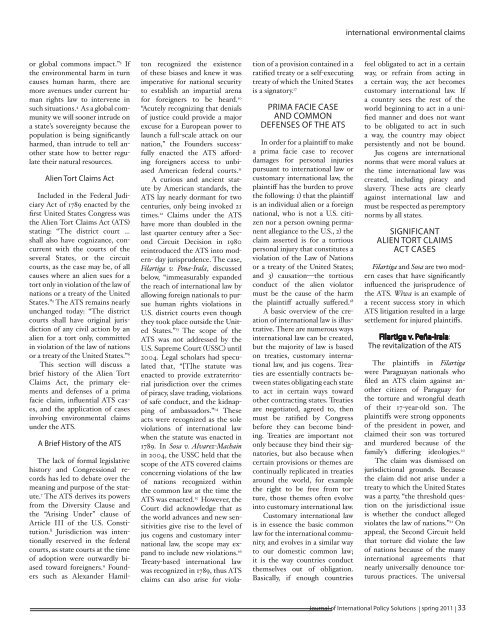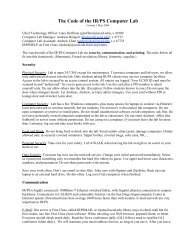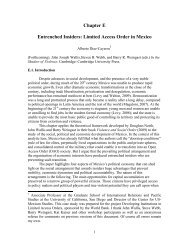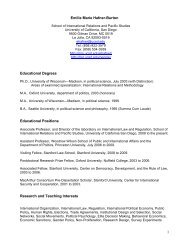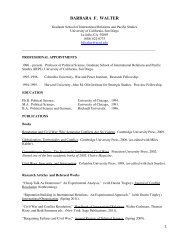to download the full journal. (1.2MB PDF) - School of International ...
to download the full journal. (1.2MB PDF) - School of International ...
to download the full journal. (1.2MB PDF) - School of International ...
Create successful ePaper yourself
Turn your PDF publications into a flip-book with our unique Google optimized e-Paper software.
international environmental claims<br />
or global commons impact.” 3 If<br />
<strong>the</strong> environmental harm in turn<br />
causes human harm, <strong>the</strong>re are<br />
more avenues under current human<br />
rights law <strong>to</strong> intervene in<br />
such situations. 4 As a global community<br />
we will sooner intrude on<br />
a state’s sovereignty because <strong>the</strong><br />
population is being significantly<br />
harmed, than intrude <strong>to</strong> tell ano<strong>the</strong>r<br />
state how <strong>to</strong> better regulate<br />
<strong>the</strong>ir natural resources.<br />
Alien Tort Claims Act<br />
Included in <strong>the</strong> Federal Judiciary<br />
Act <strong>of</strong> 1789 enacted by <strong>the</strong><br />
first United States Congress was<br />
<strong>the</strong> Alien Tort Claims Act (ATS)<br />
stating: “The district court …<br />
shall also have cognizance, concurrent<br />
with <strong>the</strong> courts <strong>of</strong> <strong>the</strong><br />
several States, or <strong>the</strong> circuit<br />
courts, as <strong>the</strong> case may be, <strong>of</strong> all<br />
causes where an alien sues for a<br />
<strong>to</strong>rt only in violation <strong>of</strong> <strong>the</strong> law <strong>of</strong><br />
nations or a treaty <strong>of</strong> <strong>the</strong> United<br />
States.” 5 The ATS remains nearly<br />
unchanged <strong>to</strong>day: “The district<br />
courts shall have original jurisdiction<br />
<strong>of</strong> any civil action by an<br />
alien for a <strong>to</strong>rt only, committed<br />
in violation <strong>of</strong> <strong>the</strong> law <strong>of</strong> nations<br />
or a treaty <strong>of</strong> <strong>the</strong> United States.” 6<br />
This section will discuss a<br />
brief his<strong>to</strong>ry <strong>of</strong> <strong>the</strong> Alien Tort<br />
Claims Act, <strong>the</strong> primary elements<br />
and defenses <strong>of</strong> a prima<br />
facie claim, influential ATS cases,<br />
and <strong>the</strong> application <strong>of</strong> cases<br />
involving environmental claims<br />
under <strong>the</strong> ATS.<br />
A Brief His<strong>to</strong>ry <strong>of</strong> <strong>the</strong> ATS<br />
The lack <strong>of</strong> formal legislative<br />
his<strong>to</strong>ry and Congressional records<br />
has led <strong>to</strong> debate over <strong>the</strong><br />
meaning and purpose <strong>of</strong> <strong>the</strong> statute.<br />
7 The ATS derives its powers<br />
from <strong>the</strong> Diversity Clause and<br />
<strong>the</strong> “Arising Under” clause <strong>of</strong><br />
Article III <strong>of</strong> <strong>the</strong> U.S. Constitution.<br />
8 Jurisdiction was intentionally<br />
reserved in <strong>the</strong> federal<br />
courts, as state courts at <strong>the</strong> time<br />
<strong>of</strong> adoption were outwardly biased<br />
<strong>to</strong>ward foreigners. 9 Founders<br />
such as Alexander Hamil<strong>to</strong>n<br />
recognized <strong>the</strong> existence<br />
<strong>of</strong> <strong>the</strong>se biases and knew it was<br />
imperative for national security<br />
<strong>to</strong> establish an impartial arena<br />
for foreigners <strong>to</strong> be heard. 10<br />
“Acutely recognizing that denials<br />
<strong>of</strong> justice could provide a major<br />
excuse for a European power <strong>to</strong><br />
launch a <strong>full</strong>-scale attack on our<br />
nation,” <strong>the</strong> Founders success<strong>full</strong>y<br />
enacted <strong>the</strong> ATS affording<br />
foreigners access <strong>to</strong> unbiased<br />
American federal courts. 11<br />
A curious and ancient statute<br />
by American standards, <strong>the</strong><br />
ATS lay nearly dormant for two<br />
centuries, only being invoked 21<br />
times. 12 Claims under <strong>the</strong> ATS<br />
have more than doubled in <strong>the</strong><br />
last quarter century after a Second<br />
Circuit Decision in 1980<br />
reintroduced <strong>the</strong> ATS in<strong>to</strong> modern-<br />
day jurisprudence. The case,<br />
Filartiga v. Pena-Irala, discussed<br />
below, “immeasurably expanded<br />
<strong>the</strong> reach <strong>of</strong> international law by<br />
allowing foreign nationals <strong>to</strong> pursue<br />
human rights violations in<br />
U.S. district courts even though<br />
<strong>the</strong>y <strong>to</strong>ok place outside <strong>the</strong> United<br />
States.” 13 The scope <strong>of</strong> <strong>the</strong><br />
ATS was not addressed by <strong>the</strong><br />
U.S. Supreme Court (USSC) until<br />
2004. Legal scholars had speculated<br />
that, “[T]he statute was<br />
enacted <strong>to</strong> provide extraterri<strong>to</strong>rial<br />
jurisdiction over <strong>the</strong> crimes<br />
<strong>of</strong> piracy, slave trading, violations<br />
<strong>of</strong> safe conduct, and <strong>the</strong> kidnapping<br />
<strong>of</strong> ambassadors.” 14 These<br />
acts were recognized as <strong>the</strong> sole<br />
violations <strong>of</strong> international law<br />
when <strong>the</strong> statute was enacted in<br />
1789. In Sosa v. Alvarez-Machain<br />
in 2004, <strong>the</strong> USSC held that <strong>the</strong><br />
scope <strong>of</strong> <strong>the</strong> ATS covered claims<br />
concerning violations <strong>of</strong> <strong>the</strong> law<br />
<strong>of</strong> nations recognized within<br />
<strong>the</strong> common law at <strong>the</strong> time <strong>the</strong><br />
ATS was enacted. 15 However, <strong>the</strong><br />
Court did acknowledge that as<br />
<strong>the</strong> world advances and new sensitivities<br />
give rise <strong>to</strong> <strong>the</strong> level <strong>of</strong><br />
jus cogens and cus<strong>to</strong>mary international<br />
law, <strong>the</strong> scope may expand<br />
<strong>to</strong> include new violations. 16<br />
Treaty-based international law<br />
was recognized in 1789, thus ATS<br />
claims can also arise for violation<br />
<strong>of</strong> a provision contained in a<br />
ratified treaty or a self-executing<br />
treaty <strong>of</strong> which <strong>the</strong> United States<br />
is a signa<strong>to</strong>ry. 17<br />
PRIMA FACIE CASE<br />
AND COMMON<br />
DEFENSES OF THE ATS<br />
In order for a plaintiff <strong>to</strong> make<br />
a prima facie case <strong>to</strong> recover<br />
damages for personal injuries<br />
pursuant <strong>to</strong> international law or<br />
cus<strong>to</strong>mary international law, <strong>the</strong><br />
plaintiff has <strong>the</strong> burden <strong>to</strong> prove<br />
<strong>the</strong> following: 1) that <strong>the</strong> plaintiff<br />
is an individual alien or a foreign<br />
national, who is not a U.S. citizen<br />
nor a person owning permanent<br />
allegiance <strong>to</strong> <strong>the</strong> U.S., 2) <strong>the</strong><br />
claim asserted is for a <strong>to</strong>rtious<br />
personal injury that constitutes a<br />
violation <strong>of</strong> <strong>the</strong> Law <strong>of</strong> Nations<br />
or a treaty <strong>of</strong> <strong>the</strong> United States;<br />
and 3) causation—<strong>the</strong> <strong>to</strong>rtious<br />
conduct <strong>of</strong> <strong>the</strong> alien viola<strong>to</strong>r<br />
must be <strong>the</strong> cause <strong>of</strong> <strong>the</strong> harm<br />
<strong>the</strong> plaintiff actually suffered. 18<br />
A basic overview <strong>of</strong> <strong>the</strong> creation<br />
<strong>of</strong> international law is illustrative.<br />
There are numerous ways<br />
international law can be created,<br />
but <strong>the</strong> majority <strong>of</strong> law is based<br />
on treaties, cus<strong>to</strong>mary international<br />
law, and jus cogens. Treaties<br />
are essentially contracts between<br />
states obligating each state<br />
<strong>to</strong> act in certain ways <strong>to</strong>ward<br />
o<strong>the</strong>r contracting states. Treaties<br />
are negotiated, agreed <strong>to</strong>, <strong>the</strong>n<br />
must be ratified by Congress<br />
before <strong>the</strong>y can become binding.<br />
Treaties are important not<br />
only because <strong>the</strong>y bind <strong>the</strong>ir signa<strong>to</strong>ries,<br />
but also because when<br />
certain provisions or <strong>the</strong>mes are<br />
continually replicated in treaties<br />
around <strong>the</strong> world, for example<br />
<strong>the</strong> right <strong>to</strong> be free from <strong>to</strong>rture,<br />
those <strong>the</strong>mes <strong>of</strong>ten evolve<br />
in<strong>to</strong> cus<strong>to</strong>mary international law.<br />
Cus<strong>to</strong>mary international law<br />
is in essence <strong>the</strong> basic common<br />
law for <strong>the</strong> international community,<br />
and evolves in a similar way<br />
<strong>to</strong> our domestic common law;<br />
it is <strong>the</strong> way countries conduct<br />
<strong>the</strong>mselves out <strong>of</strong> obligation.<br />
Basically, if enough countries<br />
feel obligated <strong>to</strong> act in a certain<br />
way, or refrain from acting in<br />
a certain way, <strong>the</strong> act becomes<br />
cus<strong>to</strong>mary international law. If<br />
a country sees <strong>the</strong> rest <strong>of</strong> <strong>the</strong><br />
world beginning <strong>to</strong> act in a unified<br />
manner and does not want<br />
<strong>to</strong> be obligated <strong>to</strong> act in such<br />
a way, <strong>the</strong> country may object<br />
persistently and not be bound.<br />
Jus cogens are international<br />
norms that were moral values at<br />
<strong>the</strong> time international law was<br />
created, including piracy and<br />
slavery. These acts are clearly<br />
against international law and<br />
must be respected as peremp<strong>to</strong>ry<br />
norms by all states.<br />
SIGNIFICANT<br />
ALIEN TORT CLAIMS<br />
ACT CASES<br />
Filartiga and Sosa are two modern<br />
cases that have significantly<br />
influenced <strong>the</strong> jurisprudence <strong>of</strong><br />
<strong>the</strong> ATS. Wiwa is an example <strong>of</strong><br />
a recent success s<strong>to</strong>ry in which<br />
ATS litigation resulted in a large<br />
settlement for injured plaintiffs.<br />
Filartiga v. Peña-Irala:<br />
The revitalization <strong>of</strong> <strong>the</strong> ATS<br />
The plaintiffs in Filartiga<br />
were Paraguayan nationals who<br />
filed an ATS claim against ano<strong>the</strong>r<br />
citizen <strong>of</strong> Paraguay for<br />
<strong>the</strong> <strong>to</strong>rture and wrongful death<br />
<strong>of</strong> <strong>the</strong>ir 17-year-old son. The<br />
plaintiffs were strong opponents<br />
<strong>of</strong> <strong>the</strong> president in power, and<br />
claimed <strong>the</strong>ir son was <strong>to</strong>rtured<br />
and murdered because <strong>of</strong> <strong>the</strong><br />
family’s differing ideologies. 20<br />
The claim was dismissed on<br />
jurisdictional grounds. Because<br />
<strong>the</strong> claim did not arise under a<br />
treaty <strong>to</strong> which <strong>the</strong> United States<br />
was a party, “<strong>the</strong> threshold question<br />
on <strong>the</strong> jurisdictional issue<br />
is whe<strong>the</strong>r <strong>the</strong> conduct alleged<br />
violates <strong>the</strong> law <strong>of</strong> nations.” 21 On<br />
appeal, <strong>the</strong> Second Circuit held<br />
that <strong>to</strong>rture did violate <strong>the</strong> law<br />
<strong>of</strong> nations because <strong>of</strong> <strong>the</strong> many<br />
international agreements that<br />
nearly universally denounce <strong>to</strong>rturous<br />
practices. The universal<br />
Journal <strong>of</strong> <strong>International</strong> Policy Solutions | spring 2011 | 33


